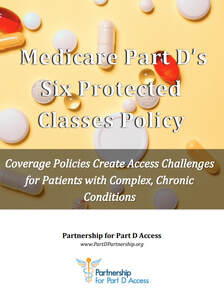Resources |
Resources |
Lawmakers on Mental Health, HIV Caucuses Urge Biden to Rescind Trump Changes to Part D Demo3/11/2021
Partnership: New Report Highlights Access Challenges for Patients with Complex, Chronic Conditions2/25/2021
 A new study from the Partnership for Part D Access confirms that the Medicare Part D protected classes policy is an essential pillar of protection for beneficiaries with complex health conditions. Yet, the research also highlights that Medicare prescription drug plans (PDPs) are increasingly limiting access to medications — even for patients with complex, chronic conditions. The study, performed by Avalere Health, a leading strategic advisory company, provides new insights into the various steps Medicare Part D plans are taking to manage utilization of medications covered under Medicare’s six protected classes policy. The protected classes policy is designed to ensure that Medicare beneficiaries with some of the most serious health conditions — cancer, HIV, epilepsy, mental illness, and those at risk of organ rejection, among others — have access to the full range of medicines recommended by their physician.  The Partnership for Part D Access sent a letter today cosigned by 138 individual patient advocacy organizations to Department of Health and Human Services Secretary-designee the Honorable Xavier Becerra, highlighting the importance of Medicare’s six protected classes policy and urging the Biden administration to reject a late Trump administration proposal to eliminate the benefit

Under a dangerous last-minute proposal from the Trump administration, millions of patients may soon lose access to vital medications. Specifically, a proposed demonstration from the Center for Medicare and Medicaid Innovation (CMMI) would allow health plans to sharply scale back their coverage of drugs in Medicare’s six “protected classes” — a policy change that would have devastating consequences for patients. This hasty, deeply misguided program would severely jeopardize Medicare beneficiary access to medications used to manage complex conditions such as cancer, mental illness, HIV-AIDS, epilepsy, Parkinson’s, and organ transplantation.
Pharmacy Stakeholders to CMMI: Scrap Trump’s Last-Ditch Effort to Weaken Protected Classes2/10/2021

Two leading Medicare beneficiary advocacy groups have joined the chorus of stakeholders calling upon the President Joe Biden to take immediate action to rescind the Trump administration’s last-minute attempt to weaken coverage requirements for drugs within the six protected classes policy. 
A recent paper in the American Journal of Managed Care confirms that patients who are prescribed medications in Medicare’s “six protected classes” are consistently utilizing lower-cost generics, despite arguments from insurance companies who have said they have limited tools to contain costs for these treatments. Indeed, the authors concluded that generic dispensing rates (GDR) in the protected classes are often much higher than their non-protected counterparts — and are at least consistent with the dispensing rates among other classes of drugs. In fact, the paper suggests that plans that dispense generics at a lower rate do so to capture larger rebates from drug manufacturers, rather than to maximize access for their beneficiaries and minimize what they would pay out-of-pocket.
 A pair of recent analyses offer new evidence that Medicare’s protected classes policy does not drive higher costs for the program and beneficiaries, despite attacks from insurance companies who have argued they should be allowed to restrict access to these needed medications. Specifically, the two analyses -- one undertaken by Milliman and the other by BluePeak Advisors -- show that the six protected classes have similar cost patterns to non-protected drugs.  The Centers for Medicare and Medicaid Services (CMS) issued a final rule that makes no changes to the current six protected classes policy — completely eliminating the potentially damaging changes included in a proposed rule released several months earlier. Instead, the agency finalized current practices that allow for prior authorization (PA) and step therapy (ST) to only be used within the protected classes for new starts. Also consistent with current practice, antiretrovirals remain excluded from utilization management altogether. Importantly, CMS did not finalize exceptions for new formulations of existing drugs or drugs whose prices increase above the urban consumer price index (CPI-U).  A new Medicare regulation could force hundreds-of-thousands of seniors and people with disabilities to lose access to the medications they use to treat conditions including cancer, HIV, mental health conditions, epilepsy, organ transplants, and others. Join this webinar to learn how you can make a difference. Over 220 HIV Providers Urge Trump Administration to Withdraw Six Protected Classes Changes4/24/2019
 Over 220 HIV providers across the country signed onto a letter from the American Academy of HIV Medicine (AAHIVM) urging the Trump administration to abandon its proposed rule that would weaken Medicare Part D's six protected classes policy. AAHIVM points out that the proposed changes could lead to increased utilization management, resulting in decreased access to lifesaving treatments for Medicare’s most vulnerable beneficiaries. “In HIV, delaying and in some cases blocking patients’ access to tailored treatment is deleterious to not only the patients’ individual health, but also to the broader public health in terms of transmissibility of the virus,” the letter states. “For these reasons, we strongly oppose the Administration’s proposal to weaken the protected classes policy and urge this proposal to be withdrawn.”  Recently, Centers for Medicare and Medicaid Services (CMS) Administrator Seema Verma sent a letter to several Members of Congress in response to their concerns about proposed changes to Medicare’s six protected classes. This fact sheet includes key substantive excerpts, each of which are followed by important facts and policy details that policymakers should be aware of.  A key group of 19 Democrats on the influential Energy & Commerce and Ways & Means Committees — which share jurisdiction over health policy — have sent a letter to HHS Secretary Alex Azar urging the Department to withdraw a proposal to weaken Medicare's protected classes policy. The letter, led by Rep. Doris Matsui (D-CA), explains that "the proposed changes to the six protected classes will result in negative outcomes for specific beneficiary populations that utilize drugs under these six classes." The Members go on to emphasize that "with a 91 percent overall generic utilization rate and only one percent of the more than 187 million prescriptions filled coming from specialty tier medications, we strongly believe this policy is working as currently implemented and should not be changed."  In a letter to Centers for Medicare and Medicaid Services (CMS) Administrator Seema Verma, a bipartisan group of 14 Senators — led by Sens. Marco Rubio (R-FL) and Kyrsten Sinema (D-AZ) — urged the agency to reconsider its proposed changes to Medicare’s six protected classes policy. The Senators emphasized that the protected classes serve as an essential patient safeguard for beneficiaries with complex medical conditions, noting that the policy has long enjoyed bipartisan support among lawmakers. “The proposed rule would allow Part D plans to limit access to critical medicines to patients in need of immunosuppressants, antidepressants, antipsychotics, anticonvulsants, antiretrovirals, and antineoplastic medicines, by permitting prior authorization or step therapy,” the letter states. “We urge CMS to reconsider this proposal that would risk the health of our most vulnerable beneficiaries.  A bipartisan group of 73 House lawmakers — led by Reps. Barbara Lee (D-CA) and Will Hurd (R-TX) — penned a letter to Department of Health and Human Services (HHS) Secretary Alex Azar opposing changes to Medicare’s six protected classes policy. The lawmakers stressed that adding additional prior authorization and step therapy requirements could have detrimental effects to beneficiaries who deal with HIV, cancer, mental illness, and other serious health conditions. “…We are concerned that these provisions of the proposed rule will have reverberating effects for patients suffering from multiple conditions that are currently covered and exacerbate health disparities among poor and minority communities,” the letter states. “Considering the public health implications of the proposed changes to Part D protected classes related to prior authorization and step therapies, we respectfully request that you withdraw the relevant portions of the rule.”  At a recent hearing of the Energy and Commerce Committee featuring HHS Secretary Alex Azar, at least four key members of the committee raised concerns with the administration's proposal to weaken Medicare's protected classes policy — including Ranking Member Greg Walden (R-OR) and Health Subcommittee Chair Anna Eshoo (D-CA). For example, when talking about the proposal that could require patients who are stabilized on an existing treatment to go through step therapy or prior authorization, Ranking Member Walden emphasized that "no patient wants to go through that, and it’s something we’ve got to pay attention to." Later, Health Subcommittee Chair Eshoo added that "I think both sides hold the same view so we have to move forward and correct that situation.”  A series of recent news articles in dozens of publications across the country highlight a myriad of concerns raised by patient advocates over a new proposal that would weaken Medicare Part D's six protected classes policy. As over 140 individual advocacy organizations are noted, it would be extremely dangerous to risk limiting access to medications for patients with the most complex chronic conditions, such as cancer, HIV, mental health conditions, Epilepsy, and others. This new one-pager from the Partnership for Part D Access provides a visual overview of some of the many articles that detail these concerns. Issue Brief: Medicare Drug Plans Exclude Coverage for Many Drugs in the ‘Protected Classes’2/27/2019
Analysis of Medicare claims data reveals that Medicare Part D plans only cover about two-thirds of drugs in the ‘six protected classes,’ often excluding brands when there is a generic alternative.  Medicare prescription drug plans only provide coverage for a select group of drugs — that list of drugs they cover is commonly known as a formulary. These formularies provide plans the ability to exclude coverage of certain medications while favoring others, which they often use as leverage to negotiate discounts from drug manufacturers. These same principles apply within Medicare’s “six protected classes” of medications, even as guardrails help ensure patients with the most complex conditions (ex. mental illness, cancer, HIV, organ transplants, epilepsy) have access to a broader selection of treatments than is available under the standard Medicare benefit. Bipartisan Mental Health Caucus Members Urge HHS to Abandon Changes to ‘Six Protected Classes’2/25/2019
 In a letter to Department of Health and Human Services (HHS) Secretary Alex Azar, House Mental Health Caucus Co-chairs Grace Napolitano (D-NY) and John Katko (R-NY) urged HHS not to move forward with harmful changes to Medicare’s Six Protected Classes Policy. The bipartisan letter — signed by 39 House members — states that the proposed changes are “particularly worrisome” for Medicare beneficiaries living with mental illness, noting that the change “directly targets” some of the program’s most vulnerable populations. “CMS has stated that patients will be able to use the lengthy appeals and exceptions processes to gain coverage for medicines if plans deny access to needed medicines,” the letter states. “However, those processes are difficult for patients to navigate and are likely to become overwhelmed with patients desperate to stay on the medicines they have been using to successfully manage complex conditions.”  Please join the Partnership for Part D Access for a congressional briefing on Wednesday, March 13 to discuss the importance of maintaining beneficiary access to the full range of available medications under Medicare’s “Six Protected Classes.  In a February 12 speech before the American Medical Association (AMA), HHS Secretary Alex Azar acknowledged the dangers inherent in requiring step therapy for patients who are already stabilized on an effective regimen of medications. Interestingly, his remarks seemed to run counter to his agency’s current proposal to weaken Medicare’s successful “six protected classes” policy. A new fact sheet from the Partnership sheds light on these comments and provides background on their application to the six protected classes policy.  A group of more than 140 leading patient advocacy organizations sent a letter today to the Centers for Medicare and Medicaid Services (CMS) in opposition to a recent proposal that would establish broad exceptions to Medicare Part D’s protected classes policy. As the letter explains, these changes to the protected classes policy threaten the well-being of Medicare beneficiaries with chronic conditions, cognitive impairments, and limitations in their activities of daily living. Meanwhile, the groups point out that potential savings CMS could realize from allowing plans to add new, more expansive restrictions on access to drugs in the protected classes would be reversed by increases in costs in other areas of Medicare and lead to undesirable patient outcomes. Specifically, CMS’s analysis overlooks the importance of the costs that could be incurred from disrupting treatment for stabilized patients and restricting access for those patients starting treatment. Partnership Comment Letter Outlines Concerns with CMS Proposal to Weaken 'Six Protected Classes'1/24/2019
 Today, Partnership for Part D Access (Partnership) submitted a comment letter to the Centers for Medicare and Medicaid (CMS) expressing concern that the agency’s recent Medicare proposal to weaken Medicare’s six protected classes will ultimately harm patients with the most complex conditions. In the letter, the Partnership highlights several concerns with CMS’ proposed rule, arguing that the agency misunderstands both the congressional intent of the policy and the reality of how it is appropriately working for Medicare patients today. The letter provides ample evidence highlighting the effectiveness of the current protected classes policy, which was created to ensure patients with the most challenging medical conditions have access to the full range of treatment options under Medicare Part D. “The flaws in the proposed approach and the potential for significant harm to patients lead us to respectfully request the agency withdraw each of the three proposed exceptions,” the letter states. Medicare Part D plans don't pay for hospital or physician services. And as research demonstrates, this makes them less invested in keeping people healthy enough to avoid some hospital visits.  The most popular type of Medicare drug coverage is through a stand-alone prescription drug plan (PDP). A stand-alone plan never has to pay for hospital or physician visits — those are covered by traditional Medicare. Another way to get drug benefits from Medicare is through Medicare Advantage (MA) plans, which are private insurance plans subsidized by the government to manage prescription drug benefits alongside other medical benefits. Because of this difference, stand-alone drug plans have less incentive than MA plans to keep people healthy enough to avoid some hospital visits. |
AuthorWrite something about yourself. No need to be fancy, just an overview. Archives
March 2021
Categories |
Learn more |
What's New? |
|
